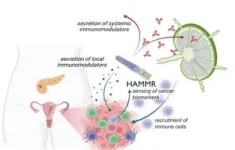The award to a Rice University-led team of researchers from seven states will fast-track development and testing of a new approach to cancer treatment that aims to dramatically improve immunotherapy outcomes for patients with ovarian, pancreatic and other difficult-to-treat cancers.
“Instead of tethering patients to hospital beds, IV bags and external monitors, we’ll use a minimally invasive procedure to implant a small device that continuously monitors their cancer and adjusts their immunotherapy dose in real time,” said Rice bioengineer Omid Veiseh, principal investigator (PI) on the ARPA-H cooperative agreement. “This kind of ‘closed-loop therapy’ has been used for managing diabetes, where you have a glucose monitor that continuously talks to an insulin pump. But for cancer immunotherapy, it’s revolutionary.”
Rice President Reginald DesRoches said, “Rice is proud to be the recipient of the second major funding award from the ARPA-H, a new funding agency established last year to support research that catalyzes health breakthroughs. The research Rice bioengineer Omid Veiseh is doing in leading this team is truly groundbreaking and could potentially save hundreds of thousands of lives each year. This is the type of research that makes a significant impact on the world.”
The team includes engineers, physicians and multidisciplinary specialists in synthetic biology, materials science, immunology, oncology, electrical engineering, artificial intelligence and other fields spanning 20 different research labs. The project and team are named THOR, an acronym for “targeted hybrid oncotherapeutic regulation.” THOR’s implant, or “hybrid advanced molecular manufacturing regulator,” goes by the acronym HAMMR.
Dr. Amir Jazaeri, a co-PI and professor of gynecologic oncology at the University of Texas MD Anderson Cancer Center, summarized the clinical need and potential of the technology as follows: “Cancer cells are continually evolving and adapting to therapy. However, currently available diagnostic tools, including radiologic tests, blood assays and biopsies, provide very infrequent and limited snapshots of this dynamic process. As a result, today’s therapies treat cancer as if it were a static disease. We believe THOR could transform the status quo by providing real-time data from the tumor environment that can in turn guide more effective and tumor-informed novel therapies.”
The THOR team includes 19 co-PIs from Rice, MD Anderson, Georgia Institute of Technology, Stanford University, Carnegie Mellon University, Northwestern University, the University of Houston, Johns Hopkins University, the Chicago-based startup CellTrans and New York City-based Bruder Consulting and Venture Group.
The THOR cooperative agreement includes funding for a first-phase clinical trial of HAMMR for the treatment of recurrent ovarian cancer. The trial is slated to begin in the fourth year of THOR’s 5 1/2-year project.
“The technology is broadly applicable for peritoneal cancers that affect the pancreas, liver, lungs and other organs,” said Veiseh, an associate professor of bioengineering at Rice and a CPRIT Scholar with the Cancer Prevention and Research Institute of Texas. “The first clinical trial will focus on refractory recurrent ovarian cancer, and the benefit of that is that we have an ongoing trial for ovarian cancer with our encapsulated cytokine ‘drug factory’ technology. We'll be able to build on that experience. We have already demonstrated a unique model to go from concept to clinical trial within five years, and HAMMR is the next iteration of that approach.”
The THOR award will be administered through the Rice Biotech Launch Pad, a new medical innovation and commercialization initiative. Directed by Veiseh, the initiative aims to rapidly turn Rice-discovered technologies into medical treatments that cure diseases and improve lives.
THOR is the second program funded under ARPA-H’s inaugural Open Broad Agency Announcement solicitation for research proposals. The first is a $24 million project to boost immune cell function led by Emory University that was awarded Aug. 23.
-30-
Video:
https://youtu.be/FruCjsGvCsg
DESCRIPTION: Funded by a $45 million grant from the Advanced Research Projects Agency for Health, or ARPA-H, the THOR Project is a first-of-its-kind approach to cancer treatment that aims to dramatically improve immunotherapy outcomes for patients with ovarian, pancreatic and other difficult-to-treat cancers. (Video by Brandon Martin/Rice University)
Image downloads:
https://news-network.rice.edu/news/files/2023/09/0925_THOR-053BMar-hammr-lg.jpg
CAPTION: A prototype of the “hybrid advanced molecular manufacturing regulator,” or HAMMR, a “closed-loop,” drug-producing implant smaller than an adult’s finger that is being developed to treat ovarian, pancreatic and other difficult-to-treat cancers. The implant, which is small enough to be implanted with minimally invasive surgery, will be able to continuously monitor a patient’s cancer and adjust their immunotherapy dose in real time. It is under development by a Rice University-led team of researchers from eight universities and two companies in seven states and is supported by a $45 million award from the Advanced Research Projects Agency for Health that includes funding for a first-phase clinical trial for recurrent ovarian cancer within five years. (Photo by Brandon Martin/Rice University)
https://news-network.rice.edu/news/files/2023/09/0925_THOR-HAMMR-fig-lg.jpg
CAPTION: A figure illustrating how a “closed-loop” implant called HAMMR (short for “hybrid advanced molecular manufacturing regulator”) will be used to treat recurrent ovarian cancer. The implant, which is small enough to be implanted with minimally invasive surgery, is being developed by a Rice University-led team of researchers from eight universities and two companies in seven states. The Advanced Research Projects Agency for Health awarded $45 million to fast-track development of the implant, which includes funding for a first-phase clinical trial within five years. (Figure courtesy of Veiseh Lab/Rice University)
https://news-network.rice.edu/news/files/2023/09/0925_THOR-ajov222bm-lg2k.jpg
CAPTION: Omid Veiseh (right) and Amir Jazaeri in Veiseh’s Rice University laboratory in August 2023. Veiseh is principal investigator on the “targeted hybrid oncotherapeutic regulation” (THOR) project, a $45 million program that the Advanced Research Projects Agency for Health (ARPA-H) is funding to fast-track the development of a small implant that can continuously monitor a patient’s cancer and adjust their immunotherapy dose in real time. Veiseh is an associate professor of bioengineering at Rice and a CPRIT Scholar with the Cancer Prevention and Research Institute of Texas. Jazaeri, a THOR co-principal investigator, is a professor of gynecologic oncology at the University of Texas MD Anderson Cancer Center, vice chair for clinical research in MD Anderson’s Department of Gynecologic Oncology and Reproductive Medicine and director of MD Anderson’s Gynecologic Cancer Immunotherapy Program. (Photo by Brandon Martin/Rice University)
https://news-network.rice.edu/news/files/2023/09/0925_THOR-0119Bmar156-Veiseh-lg.jpg
CAPTION: Omid Veiseh, an associate professor of bioengineering at Rice University, is the principal investigator on the THOR Project. Short for “targeted hybrid oncotherapeutic regulation,” THOR is a $45 million program by the Advanced Research Projects Agency for Health (ARPA-H) to fast-track development of a small implant that can continuously monitor a patient’s cancer and adjust their immunotherapy dose in real time. (Photo by Brandon Martin/Rice University)
Related stories:
Rice Biotech Launch Pad accelerator aims to rapidly turn medical and health discoveries into cures – Sept. 12, 2023
https://news.rice.edu/news/2023/rice-biotech-launch-pad-accelerator-aims-rapidly-turn-medical-and-health-discoveries
‘Drug factory’ implants eliminate mesothelioma tumors in mice – Aug. 22, 2022
news.rice.edu/news/2022/drug-factory-implants-eliminate-mesothelioma-tumors-mice
Rice lab’s ‘drug factory’ implants cleared for human trials – Aug. 3, 2022
news.rice.edu/news/2022/rice-labs-drug-factory-implants-cleared-human-trials
‘Drug factory’ implants eliminate ovarian, colorectal cancer in mice – March 2, 2022
news.rice.edu/news/2022/drug-factory-implants-eliminate-ovarian-colorectal-cancer-mice
THOR investigators:
Omid Veiseh* - Rice University
Isaac Hilton - Rice University
Laura Segatori - Rice University
Oleg Igoshin - Rice University
Jacob Robinson - Rice University
Jonathan Rivnay - Northwestern University
Shana Kelley - Northwestern University
Tzahi Cohen-Karni - Carnegie Mellon University
Rahul Panat - Carnegie Mellon University
Douglas Weber - Carnegie Mellon University
Josiah Hester - Georgia Institute of Technology
Yingyan Lin - Georgia Institute of Technology
Ken Chen - MD Anderson Cancer Center
Amir Jazaeri - MD Anderson Cancer Center
Nathan Reticker-Flynn - Stanford University
Jamie Spangler - Johns Hopkins University
Weiyi Peng - University of Houston
Susan Drapeau - Bruder Consulting
José Oberholzer - Cell Trans
*Principal investigator
Links:
ARPA-H: arpa-h.gov
Veiseh lab: veisehlab.rice.edu
Rice Biotech Launch Pad: biotechlaunchpad.rice.edu
Rice Bioengineering: bioengineering.rice.edu
George R. Brown School of Engineering: engineering.rice.edu
This release can be found online at news.rice.edu.
Follow Rice News and Media Relations via Twitter @RiceUNews.
Located on a 300-acre forested campus in Houston, Rice University is consistently ranked among the nation’s top 20 universities by U.S. News & World Report. Rice has highly respected schools of Architecture, Business, Continuing Studies, Engineering, Humanities, Music, Natural Sciences and Social Sciences and is home to the Baker Institute for Public Policy. With 4,240 undergraduates and 3,972 graduate students, Rice’s undergraduate student-to-faculty ratio is just under 6-to-1. Its residential college system builds close-knit communities and lifelong friendships, just one reason why Rice is ranked No. 1 for lots of race/class interaction and No. 4 for quality of life by the Princeton Review. Rice is also rated as a best value among private universities by Kiplinger’s Personal Finance.
END










